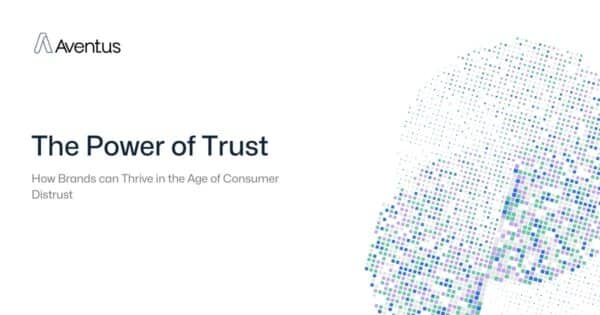
By Michael Johnson, Chief Sales Officer at Aventus
In today’s digital landscape, consumer distrust is at an all-time high. Users are increasingly taking control over their data. Regulators and data platforms are listening, tightening down and giving more and more control to the consumer. Brands must adapt to this shifting paradigm to remain relevant and competitive.
Changing Dynamics of Consumer Behavior
Trust has emerged as a driving force behind consumer behavior, with a significant majority of people expressing that trusting the brands they buy or use is more important now than ever before. The 2023 Edelman Trust Barometer revealed that a staggering 71% of consumers now prioritize trust in their purchasing decisions more than they did before, highlighting the pivotal role it plays in brand loyalty and advocacy. When consumers trust a brand, they are not only more likely to remain loyal but also to advocate for it, ultimately leading to increased sales.
The Trust Payoff
The correlation between trust and business success is undeniable. According to Boston Consulting Group in their 2022 Trust Index, the top 100 most trusted companies have been shown to generate 2.5 times more value than their counterparts and enjoy 47% higher P/E multiples.
The Cost of Trust Erosion
Conversely, the erosion of trust can have detrimental consequences for brands. In RepTrak’s Global RepTrak 100 Ranking, a mere five-point drop in reputation rank can result in the loss of 5% of loyal customers, who no longer trust the brand.
Earning Customer Trust: Strategies for Success
To thrive in this landscape, brands must proactively earn and maintain the trust of their customers by both seeding trust and controlling distrust, two sides of the same coin. This involves:
- Get Real and Be Honest: according to a PWC study, 87% of executives think customers highly trust their companies, when in reality it’s roughly 30%. This significant perception gap underscores the importance of honesty in assessing how customers truly perceive your brand. It is crucial to understand the actual sentiments of your customers as a baseline for improvement.
- Leverage Zero-Party Data: reclaiming control from third-party platforms and establishing direct customer relationships across all sales channels — direct-to-consumer, wholesale and second-hand markets — empowers brands to forge new connections, glean valuable insights and cultivate trust through personalized interactions. This includes more mutual, flexible, verifiable, and immutable data sharing agreements. This imperative is made even more critical by the deprecation of browser cookies and clamp downs in data sharing policies enacted by companies like Apple in the release of their 14.5 OS.
- Deliver Unique Post-Sale Experiences: Brands can cultivate trust by providing innovative and personalized post-sale experiences that foster a deeper connection with customers. According to the 2023 Edelman Trust Barometer, 78% of consumers say they uncover things that attract them and make them loyal to a brand after their first purchase.
- Product Traceability: Providing transparency and proof-of-stake throughout the supply chain, from origin to owner, not only instills confidence in consumers but also strengthens trust in the brand’s dedication to quality, sustainability, and social responsibility. A study by the World Economic Forum reveals that spending on sustainable brands and products by Gen X has surged by 24% since 2019. This trend is even more pronounced among younger generations, particularly Gen Z, which demonstrates the greatest concern for the planet’s well-being and actively influences others to prioritize sustainability in their purchasing decisions. Governments have also taken notice – by 2030, the EU will require Digital Product Passports, with environmental impact information made available to the consumer on every textile-based product.
- Embrace Transparency: By offering information in an impartial manner and acknowledging that customers have ownership of their data, it becomes incumbent upon brands to establish mutually agreeable terms for its usage. Through this approach, brands can alleviate distrust and showcase their dedication to transparency and authenticity. It’s essential for brands to avoid the perception of self-assessment and instead, incorporate some form of third-party verification, governance and oversight to bolster trustworthiness.
Trust at Scale: The Role of Blockchain
Blockchain technology plays a pivotal role in fostering trust (and mitigating distrust) amongst consumers and allows enterprises to integrate trust across their digital ecosystem at scale. By its very nature, blockchain offers transparency, immutability, and decentralization, creating a system where data is securely recorded and tamper-proof. This transparency allows consumers to track and verify transactions, ensuring the authenticity and integrity of products and information. Moreover, blockchain enables the creation of smart contracts and decentralized applications (DApps) that facilitate direct peer-to-peer interactions, eliminating the need for intermediaries and reducing the risk of manipulation or fraud.
As a result, blockchain not only instills confidence in consumers by providing a trustworthy and transparent ecosystem but also empowers them with greater control over their data and transactions, ultimately fostering a more trusting relationship between brands and consumers. Numerous enterprise blockchain applications are emerging in this domain, focusing on traceability, digital certificates of authenticity and the utilization of advanced digital wallets designed to securely store tokens, facilitate ownership management and enable participation in immersive loyalty and rewards programs.
Trust is a Brand Cornerstone
As we navigate the Trust Economy, brands must recognize the pivotal role that their perceived trustworthiness plays in shaping consumer opinions and behaviors. By prioritizing transparency, delivering exceptional experiences, embracing data-driven strategies and integrating blockchain and Web3 technologies into your digital ecosystem, brands can thrive in this new era of trust and emerge as leaders in their respective categories.
If you’d like to learn more about how you can get started with Aventus click here.
Michael Johnson is Chief Sales Officer at Aventus and started his career in consumer brand marketing before venturing into online marketplaces, enterprise SaaS applications, blockchain and Web3.




